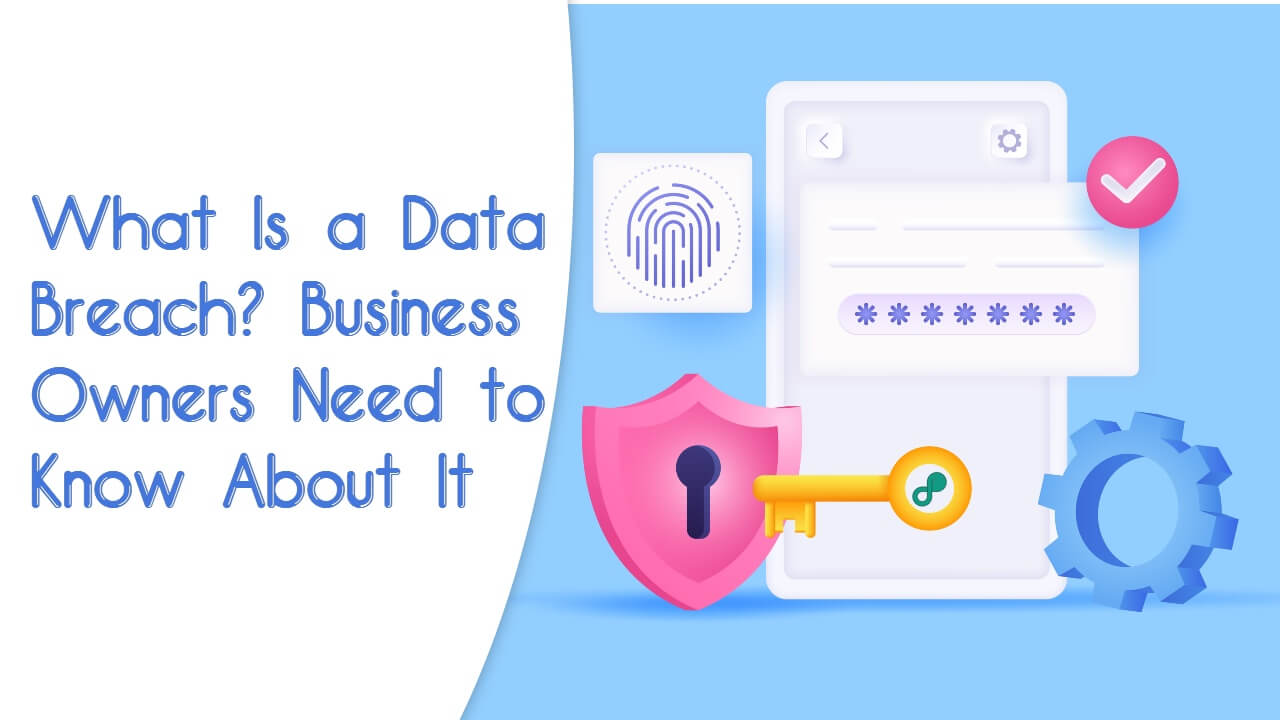20 Jul

Data breaches are becoming increasingly common in today’s digital world, and as a business owner, it’s crucial to understand how to protect yourself.
This information theft occurs when malicious actors gain unauthorized access to an organization’s systems, databases, or networks, allowing them to access, modify, or delete confidential information or records. It can have serious repercussions, from financial losses to reputational damage.
We’ll explore what a data breach is in more detail and why entrepreneurs must be informed of its potential dangers. You’ll also learn how you can protect yourself and your customers from these leakages.
Let’s dive in!
Data Breach: An Overview
In a few words, a data breach is a security violation. It occurs when an individual or entity gains unauthorized access to a company's computer systems, network, or database and extracts or steals valuable data.
This data can include personal information, such as names, addresses, social security numbers, credit card details, or even trade secrets and intellectual property.
Privacy violations have become increasingly common in recent years, posing a significant threat to businesses of all sizes. In fact, Astra reports that during the period of March 2021 to February 2022, data breaches compromised no fewer than 42 million records.
These breaches can be caused by various factors, including human error, system vulnerabilities, malware attacks, phishing scams, or even insider threats.
The consequences can be severe for businesses. Apart from the financial impact, such as potential fines, legal fees, and loss of customer trust, it can also result in reputational damage and harm a company's brand image.
Therefore, it is essential to understand what these leakages entail and take proactive measures to prevent and mitigate such incidents.
Common Causes of Data Breaches
Cybercriminals' attack tactics are growing increasingly complex, and companies of all sizes and industries are at risk of experiencing a privacy violation. Here are some common causes of information leakage that you need to be aware of:
Phishing attacks
Based on Verizon's 2022 study, phishing accounted for 36 percent of all breaches. Cybercriminals send emails, messages, or links that appear to be from legitimate sources to trick individuals into supplying login details or other sensitive information.
Malware
This malicious software can infect a system, giving hackers access to sensitive data.
Social engineering
Hackers may manipulate individuals through social media or other means to obtain confidential information.
Insider threats
Employees or contractors with access to sensitive data can intentionally or unintentionally cause data spills.
Weak passwords
Passwords that are easily guessed or reused across multiple accounts are vulnerable to attacks.
Physical theft
Information leakages don't always happen online. Physical theft of devices such as laptops, smartphones, or hard drives can result in the loss of confidential data.
Third-party breaches
Companies often work with third-party vendors or partners who may have access to their data. If one of these vendors experiences a breach, it could potentially impact the security of your information as well.
Why Business Owners Should Know About Data Breaches?
Information leaks can have devastating consequences for SMEs and big corporations alike. Not only do they compromise the security and privacy of sensitive information, but they can also lead to financial losses, reputational damage, and legal consequences.
If you’re still wondering why you need to know about these security incidents, here are some of the key impacts they can have on businesses:
Financial losses
Information leaks often result in financial losses. These can include expenses related to investigating the leakage, notifying affected customers, offering credit monitoring services, and potential legal fees and settlements.
Reputational damage
When leakage occurs, the reputation of a brand can be significantly impacted. Customers may lose faith in the company's capacity to safeguard their personal information, leading to a decline in sales and a damaged brand image.
Legal consequences
Businesses may face legal consequences depending on the nature of the information compromised. This can include regulatory fines, lawsuits from affected customers or shareholders, and potential investigations by government agencies.
Loss of competitive advantage
If sensitive information, such as trade secrets or customer data, is stolen, competitors may gain access to valuable insights and leverage it for their benefit.
Operational disruptions
Dealing with the aftermath of data leakage can cause significant disruptions to your operations. It can include allocating resources to investigate and mitigate the leakage, implementing new security measures, and addressing customer concerns and inquiries.
Protecting Your Business from Data Breaches
As a business owner, it is crucial to prioritize the protection of your company's data from potential leakages. Taking proactive measures can save you from potential financial losses and reputational damage. Here are some effective strategies to safeguard your enterprise:
Educate employees
Train your employees about the best data security practices and the importance of maintaining strong passwords. Conduct regular awareness programs to keep them updated about the latest threats and preventive measures.
Implement strong authentication
Require multi-factor authentication for accessing sensitive data and systems. This gives additional protection by confirming the identity of users through additional verification steps.
Regularly update software and systems
Ensure that all software, operating systems, and security patches are current. Outdated systems are more vulnerable to cyberattacks.
Use encryption
Encrypting sensitive data adds an extra layer of protection, even if the data is compromised. Use encryption for data in transit, as well as stored data.
Secure physical assets
Limit physical access to servers, computers, and other devices containing sensitive information. Implement security measures like surveillance cameras, alarms, and access controls to prevent unauthorized access.
Conduct regular security audits
Regularly review your security measures and conduct audits to identify any vulnerabilities or weaknesses. Address these issues promptly to minimize the risk of information leaks.
Beware of suspicious links and phone calls
Links and phone calls can be dangerous because you may accidentally disclose some information that isn’t supposed to be shared with anyone outside of your business circle. If you click on a spam link, let’s say, it will transfer you to a malicious website that will get hold of your business details. If you answer a phone call that is supposedly from your partner or someone you trust and tell something secretive, like a certain password or confidential client information, the outcome won’t be positive. That is why you have to know exactly who’s calling you. Just enter the phone number on Nuwber and click “Search” to see if that number belongs to the person in question.
Key Steps to Take If Your Business Experiences a Data Breach
Experiencing a privacy violation is a stressful and overwhelming situation for any business owner. However, it is crucial to take immediate action to mitigate the damage and protect your company and your customers' information.
Here are the key steps you should take if you experience it:
Assess the situation
Determine the extent of the breach, what data was compromised, and how it happened. This will help you understand its severity and make informed decisions.
Secure your systems
Take immediate steps to secure your systems and prevent any further unauthorized access. This may involve changing passwords, updating security measures, and isolating affected systems.
Notify authorities and affected individuals
Depending on the nature of the leakage, you may be legally obligated to notify relevant authorities and affected individuals. Make sure you abide by all applicable local rules and regulations.
Inform your customers
Gaining your consumers' trust requires effective communication. Inform them about the breach, what information was compromised, and the steps you are taking to address the issue and prevent future occurrences.
Engage with cybersecurity professionals
It is crucial to seek assistance from cybersecurity professionals who can help investigate infringements, identify vulnerabilities, and provide guidance on strengthening your security measures.
Conduct a thorough internal investigation
Evaluate your existing security protocols and identify any weaknesses that contributed to the attack. Implement necessary changes to prevent similar incidents in the future.
Offer support to affected individuals
Provide resources and support to those whose data was compromised, such as credit monitoring services or assistance with identity theft protection.
Final Thoughts
Understanding what a data breach is and its potential consequences is crucial for every business owner. It can occur in various ways, leading to severe financial and reputational damage.
It is necessary to put in place effective security measures to protect sensitive information and regularly update the systems to stay ahead of cyber threats.
By staying informed and taking proactive steps, you can mitigate the risk of these privacy violations and safeguard your valuable data.
.png)













Jay Pala